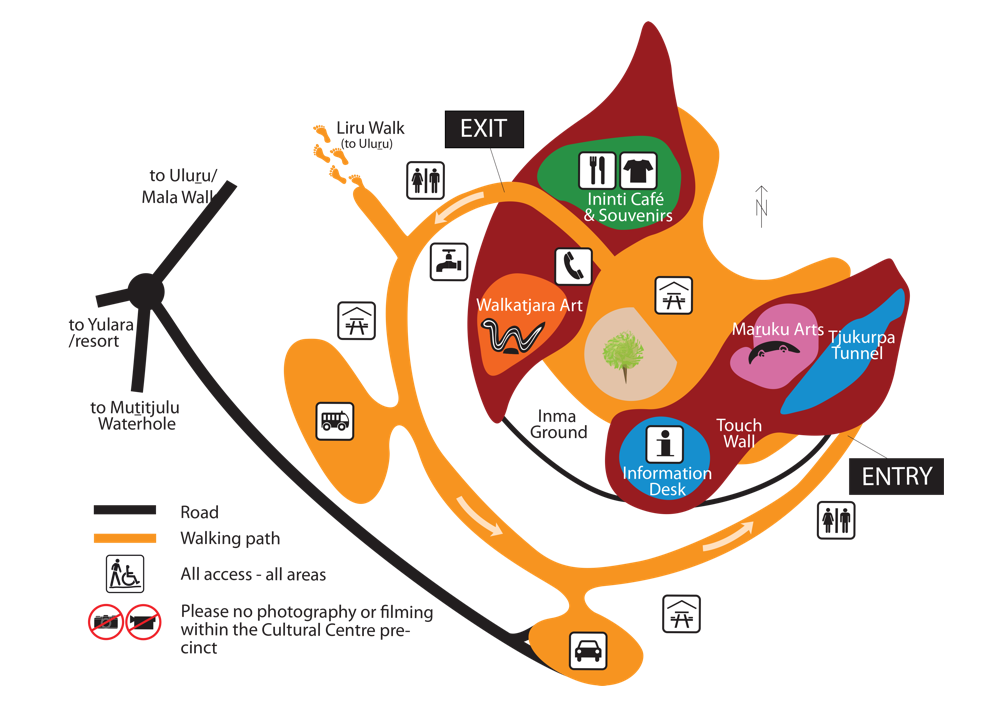
The Uluru-Kata Tjuta Cultural Centre is an essential starting point for visitors to the Uluru-Kata Tjuta National Park in the Northern Territory of Australia. This center offers an immersive introduction to the cultural significance of the park's iconic natural landmarks, Uluru (Ayers Rock) and Kata Tjuta (The Olgas), through the perspectives of the local Anangu people, the traditional custodians of the land.
Designed to educate and inspire, the Cultural Centre houses a range of exhibits, artworks, and installations that showcase Anangu culture, art, and history. Visitors can learn about Tjukurpa, the foundational spiritual law that guides the Anangu's way of life, including their creation stories, cultural practices, and connection to the land.
The Cultural Centre also serves as an essential hub for planning walks and tours around Uluru and Kata Tjuta, providing maps, brochures, and advice on how to explore the park responsibly and sustainably. It's a place where visitors are encouraged to gain a deeper appreciation for the area's natural beauty and cultural depth, promoting respect and preservation for one of Australia's most iconic landscapes.
Visiting the Uluru-Kata Tjuta Cultural Centre is a must-do for anyone seeking to connect with the spirit and story of Uluru and its surroundings, offering a meaningful complement to the physical exploration of the park.
Located just beyond the Cultural Centre, this picnic spot boasts an unobstructed view of Uluru, offering an ideal setting for outdoor dining. Equipped with picnic tables, gas grills, and ample shelter, it's a perfect location for enjoying a meal amidst nature.
The Cultural Centre is on the main road to Uluru, 10–15 minutes drive from the park entry station.
Open from 7 am – 5:45 pm every day.
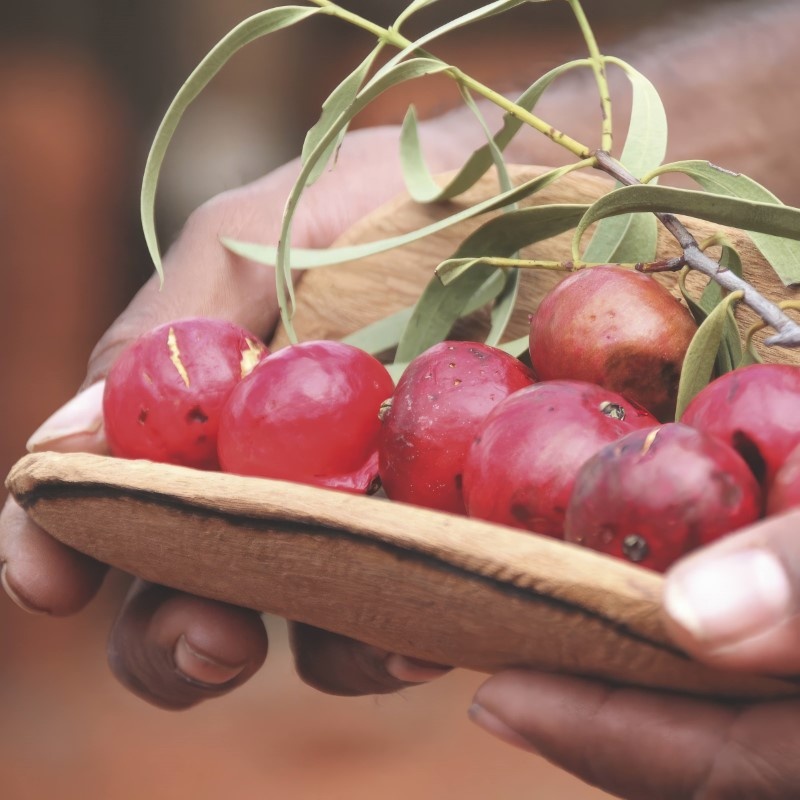
The Anangu are the Indigenous Australian people from the Central Australian region which is located in the Northern Territory. They are composed of several different tribal groups including the Pitjantjatjara, Yankunytjatjara, Ngaanyatjarra, Luritja, and others, each with their own distinct languages and cultural practices.
The Anangu have lived in the Central Australian desert for tens of thousands of years and have a deeply spiritual connection to the land. Their knowledge and beliefs are encapsulated in what is often referred to as the "Tjukurpa," the Anangu law, which encompasses religion, morality, and law as well as the relationship between people, plants, animals, and the physical features of the land.
One of the most significant sites for the Anangu is Uluru (also known as Ayers Rock), a massive sandstone monolith that is sacred to them. The rock formations of Uluru and Kata Tjuta (the Olgas) have great cultural significance, featuring in their traditional stories and rituals. The Anangu are recognized as the traditional custodians of these lands, which are part of the Uluru-Kata Tjuta National Park. They work to protect the cultural and natural values of this World Heritage site, often in collaboration with Parks Australia.
The Anangu culture is rich in art, storytelling, and ceremonies, with their intricate dot paintings being perhaps the most well-known expression of their artistic traditions. These paintings often tell stories of the Tjukurpa, or Dreamtime, and represent both the physical and spiritual world.
The Anangu people have faced and continue to face challenges due to European settlement, including the loss of land, language, and cultural practices. However, they have also been at the forefront of the land rights movement in Australia, achieving significant milestones such as the handback of Uluru and surrounding lands to the traditional owners in 1985.
The Anangu are also involved in various community-based projects to preserve their culture, such as language revitalization programs, cultural centers, and tourism initiatives that educate visitors about their heritage and the importance of the land and its preservation.
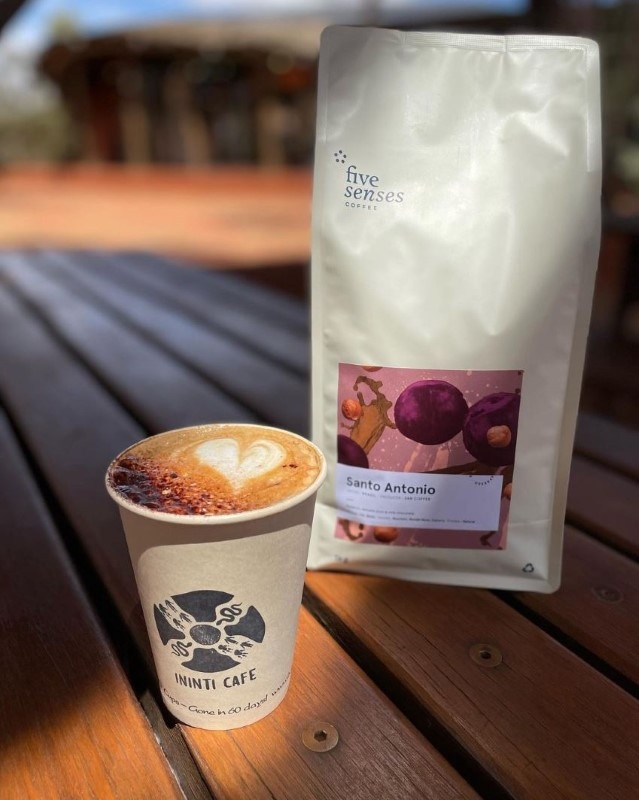
The Ininti Café & Souvenir Shop is located within the Uluru-Kata Tjuta Cultural Centre and serves as a convenient spot for visitors to refresh and relax during their exploration of Uluru. The café offers a range of food and beverage options, catering to a variety of tastes with a selection that includes light meals, snacks, and drinks. It's an ideal place to take a break and enjoy a coffee or grab a quick bite in the midst of a day spent exploring the natural and cultural wonders of the area.
In addition to serving refreshments, Ininti Café also features a souvenir shop where visitors can browse a selection of gifts, crafts, and other items that reflect the cultural heritage of the area. This allows tourists to take a piece of their Uluru experience home with them, with offerings ranging from locally made art and crafts to books, postcards, and other memorabilia that celebrate Anangu culture and the natural beauty of Uluru.
The café and shop are designed to enhance the visitor experience at the Cultural Centre, providing not only sustenance and shopping opportunities but also a place to relax and reflect on the profound cultural and spiritual significance of Uluru. The presence of such amenities within the Cultural Centre ensures that visitors have access to essential services while supporting the local economy and cultural preservation efforts.
The Tjukurpa Tunnel is an important feature at the Uluru-Kata Tjuta Cultural Centre. It provides visitors with a deep insight into the Aboriginal culture and the spiritual laws, stories, and traditions associated with Uluru and the surrounding land. Tjukurpa (sometimes spelled Tjukurpa) is a term from the local Anangu language that refers to the law, religion, and morality of the Anangu people, as well as the stories of creation that define their relationship with the land.
The tunnel itself is designed to immerse visitors in the Tjukurpa, offering an educational and respectful way to understand the significance of Uluru and its cultural landscape. Through a combination of visual art, narratives, and displays, the Tjukurpa Tunnel educates visitors about the Anangu's way of life, their ancestral beings, and the creation stories that are deeply embedded in the physical features of Uluru and the surrounding desert.
Visiting the Tjukurpa Tunnel is an opportunity to gain respect for and an understanding of Aboriginal culture and its enduring connection to the land. It is an essential part of the experience for those visiting Uluru, providing context and depth to the majestic natural beauty of the area.
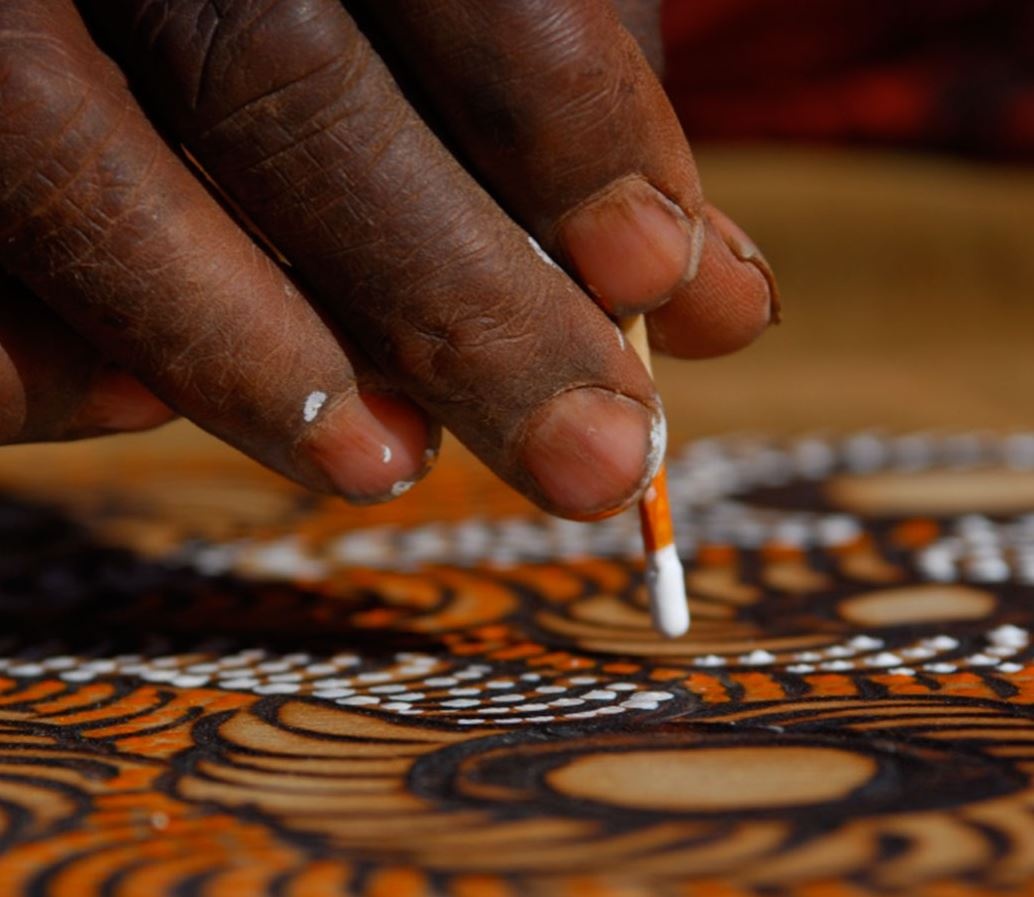
Maruku Arts, located at the Cultural Centre, is a not-for-profit art and craft corporation that specializes in traditional Anangu (the local Aboriginal people) art and crafts from the Western and Central Deserts of Australia. It operates as a collective for Anangu artists, providing a vital platform for them to showcase and sell their work, including wood carvings, paintings, and traditional punu (woodwork).
The gallery is a significant cultural hub, offering tourists and art collectors the opportunity to experience and purchase authentic Indigenous art. Maruku Arts is known for its commitment to ethical practices and the promotion of Anangu culture, ensuring that the artists receive fair compensation for their work. The organization also plays a crucial role in supporting the local Indigenous community by providing income, preserving traditional crafts, and promoting cultural understanding and respect.
Located at the Uluru-Kata Tjuta Cultural Centre, Maruku Arts offers visitors a unique insight into the rich cultural heritage of the Anangu people through its extensive collection of art and crafts. The gallery not only serves as a marketplace for traditional art but also as an educational resource, offering demonstrations, workshops, and talks that allow visitors to engage directly with Anangu culture and learn about the meanings and stories behind the art.
By visiting Maruku Arts, tourists can take a piece of Uluru's cultural heritage home with them while supporting the local Indigenous community and gaining a deeper appreciation for the significance of Anangu art and culture.
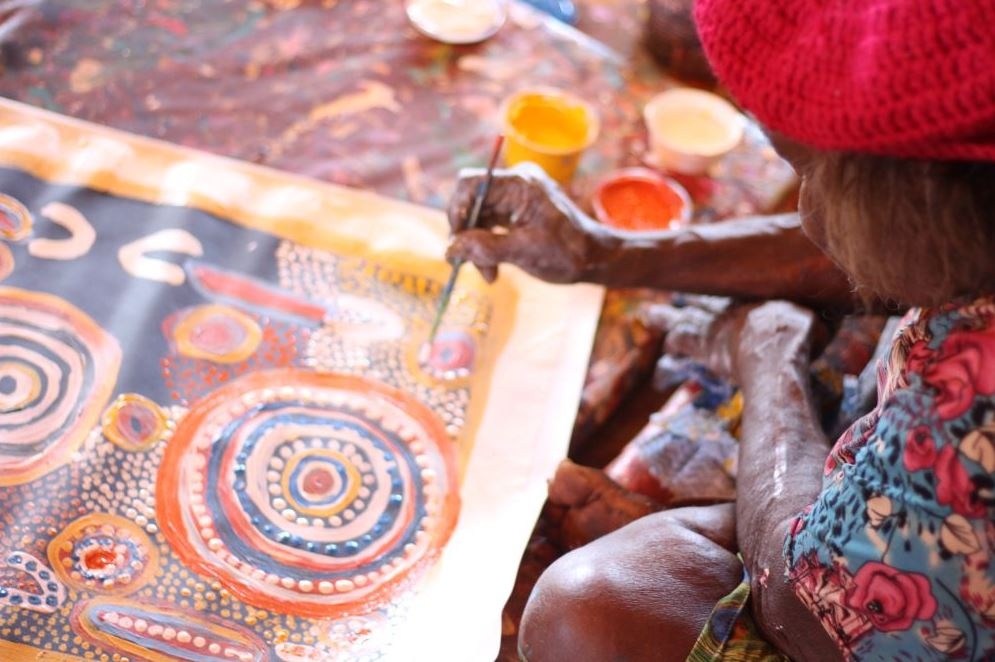
The Walkatjara Art Uluru, located at the Uluru-Kata Tjuta Cultural Centre, is a significant and vibrant part of the local Indigenous community's cultural expression. It is run by the traditional owners of Uluru, the Anangu people, and represents a key site for the presentation and sale of authentic Aboriginal art. This gallery is a crucial component of the Cultural Centre, offering visitors the opportunity to explore and purchase genuine Anangu art, which encompasses a variety of forms including paintings, crafts, and traditional works.
Walkatjara Art is more than just a gallery; it's a cooperative endeavor that empowers local artists by providing them with a space to create and sell their work, thereby contributing to the sustainability of the community's cultural heritage and economy. The art produced and sold here is deeply rooted in the Tjukurpa, the creation stories and spiritual law that guide the Anangu people's way of life. Each piece of art available in the gallery is a reflection of the rich cultural narratives, connections to the land, and the unique perspectives of the artists.
Visitors to Walkatjara Art can engage with the art and artists on a personal level, often having the opportunity to meet the artists in person, learn about their techniques, and hear the stories behind their creations. This direct interaction enriches the experience, making it not just a transaction but an exchange of culture and understanding.
By supporting Walkatjara Art, visitors contribute directly to the local Indigenous community, ensuring that traditional skills are preserved and passed down through generations. It's an opportunity for tourists to take home a piece of the spiritual and cultural essence of Uluru, while also respecting and acknowledging the significance of the land and its traditional custodians.
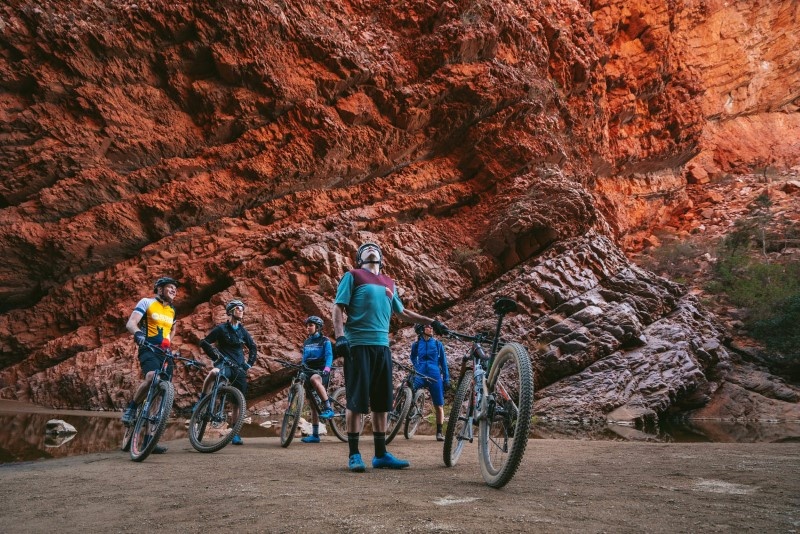
Located conveniently in the car park of the Uluru-Kata Tjuta Cultural Centre, Outback Cycling is easily accessible for those eager to embark on a journey around the base of Uluru, discovering ancient rock art and stunning waterholes. Outback Cycling offers an unforgettable experience with their Uluru Bike Ride service, allowing visitors to explore the majestic Uluru at their own pace.
The service operates from sunrise until late afternoon, with the hours varying by season to ensure the best experience for riders. It's important for visitors to be aware that certain sections of the Uluru base walk may be closed during periods of extreme temperatures for safety reasons. Nevertheless, Outback Cycling ensures that a shorter ride option remains available on these days, ensuring that no one misses out on the experience.
Outback Cycling prides itself on being a family-friendly option with various bike options to cater to all ages—from toddlers to adults. This inclusivity makes it one of the best-value activities available at Uluru. For those without personal transport, the Uluru Bike Ride & Transfers Package is an excellent choice, including return bus transfers to and from Ayers Rock Resort provided by Uluru Hop On Hop Off.
Prices for the Uluru Bike Ride start at $40 for a toddler seat (age 1-4) up to $70 for a standard bike (age 11+), ensuring that families and individuals alike can find an option that suits their needs. The package includes a helmet and allows 3 hours to complete the base ride. For those opting for the convenience of the Uluru Bike Ride including transfers, prices range from $55 for a toddler seat and transfer up to $119 for a standard bike and transfer, including helmet, 3 hours for the ride, and return bus transfers.
Visitors are advised to book in advance, especially during school holiday periods, to secure their spot. Outback Cycling emphasizes the importance of bringing plenty of water, sunscreen, appropriate clothing for bicycle riding, and, crucially, a camera to capture the breathtaking scenery. With no credit card surcharge when booking through their website, Outback Cycling makes booking your bike ride around Uluru straightforward and more appealing.